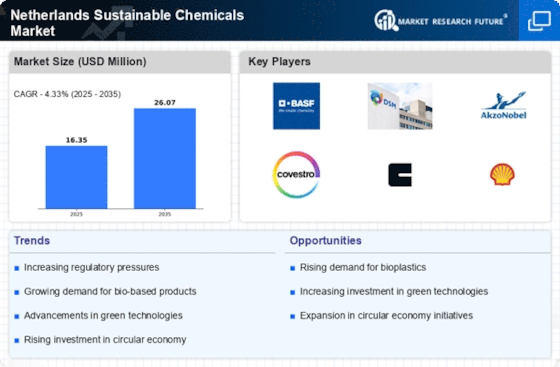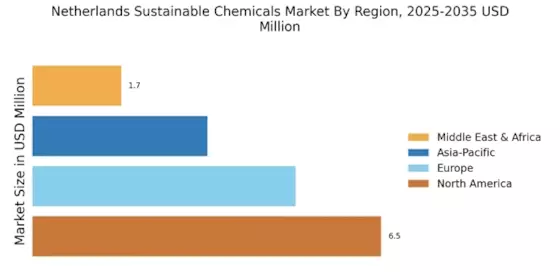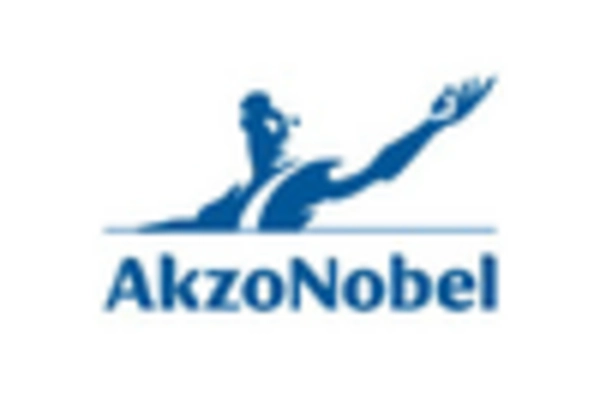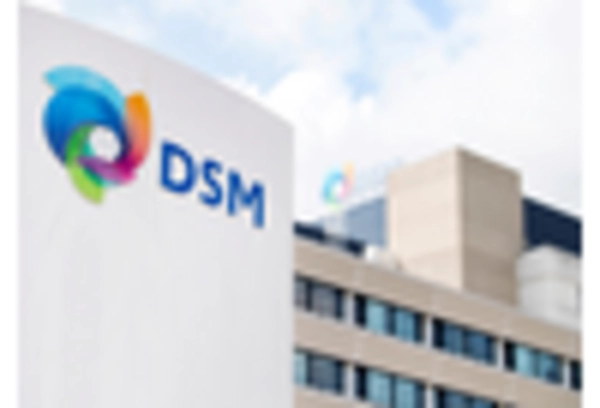International Trade Opportunities
The Netherlands Sustainable Chemicals Market is poised to benefit from expanding international trade opportunities. As global demand for sustainable chemicals rises, the Netherlands is strategically positioned as a key player in the European market. In 2025, it is estimated that exports of sustainable chemicals from the Netherlands could increase by 25%, driven by favorable trade agreements and a strong reputation for quality. This growth in international trade not only enhances the visibility of Dutch sustainable products but also encourages local manufacturers to scale their operations. The ability to access new markets presents a significant opportunity for companies within the industry, potentially leading to increased revenues and market share. As the global landscape shifts towards sustainability, the Netherlands is likely to emerge as a hub for sustainable chemical exports.
Government Policies and Incentives
The Netherlands Sustainable Chemicals Market benefits significantly from robust government policies and incentives aimed at promoting sustainability. The Dutch government has implemented various initiatives, including tax breaks and grants for companies investing in sustainable practices. In 2025, it is estimated that these incentives could lead to a 20% increase in the adoption of sustainable chemicals among manufacturers. Such policies not only encourage existing companies to transition towards greener alternatives but also attract new entrants to the market. The regulatory framework is designed to support innovation while ensuring compliance with environmental standards. This proactive approach by the government is likely to create a conducive environment for the growth of the sustainable chemicals sector, fostering collaboration between public and private entities.
Growing Awareness of Environmental Impact
There is a notable increase in awareness regarding the environmental impact of chemical production within the Netherlands Sustainable Chemicals Market. Consumers and businesses alike are becoming more conscious of the ecological footprint associated with traditional chemical processes. This heightened awareness is driving demand for sustainable alternatives, as stakeholders seek to minimize their environmental impact. In 2025, it is projected that the market for sustainable chemicals could grow by 15% as consumers prioritize eco-friendly products. Companies are responding to this shift by reformulating their product lines to include sustainable options, thereby aligning with consumer preferences. This trend not only enhances brand loyalty but also positions companies favorably in a competitive market increasingly focused on sustainability.
Increased Investment in Sustainable Technologies
The Netherlands Sustainable Chemicals Market is witnessing a surge in investments directed towards sustainable technologies. This trend is largely driven by both public and private sectors recognizing the need for environmentally friendly alternatives. In 2025, investments in sustainable chemical production technologies are projected to reach approximately 1.5 billion euros, reflecting a growing commitment to sustainability. Companies are increasingly allocating resources to research and development, aiming to innovate and enhance the efficiency of sustainable chemical processes. This influx of capital not only fosters innovation but also positions the Netherlands as a leader in sustainable chemical production, potentially attracting further investments and partnerships. As a result, the industry is likely to experience accelerated growth, driven by advancements in technology and a collective push towards sustainability.
Technological Advancements in Chemical Production
Technological advancements play a crucial role in shaping the Netherlands Sustainable Chemicals Market. Innovations in production processes, such as the development of biocatalysis and green chemistry techniques, are enabling manufacturers to produce chemicals with reduced environmental impact. In 2025, it is anticipated that these advancements could lead to a 30% increase in the efficiency of sustainable chemical production. Companies are investing in cutting-edge technologies that not only enhance productivity but also lower energy consumption and waste generation. This shift towards more efficient production methods is likely to attract further investment and drive the growth of the sustainable chemicals sector. As technology continues to evolve, the industry is expected to adapt, fostering a culture of continuous improvement and sustainability.

















